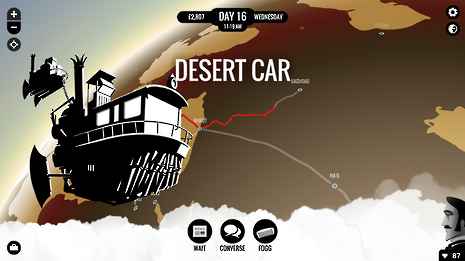Games: The Beginner’s Guide and 80 Days
Michael Davin reviews these two masterpieces of storytelling
The Beginner’s Guide
80 Days
The Beginner’s Guide

The Beginner’s Guide is the creation of Davey Wreden, the singular talent behind indie gaming smash hit The Stanley Parable. While his first game was a masterfully scripted and stupidly funny satire of the basic tropes of pretty much every game ever, his new project is an altogether much more personal and menacing affair.
Framed as a collection of levels made by a friend of Wreden’s, and with his helpful voiceover guiding the player through each stage, the experience is a deeply conflicting one. It isn’t a virtual museum – instead, many different layers of the work shift and mutate through its course to reveal a far more intricate piece. Coda, the anonymous creator whose worlds you inhabit, has no real voice other than ludonarrative – the ideas communicated by the play itself – and he is constantly undermined by Wreden as levels are variously tweaked and butchered for the sake of ‘curation’. As a character, Wreden himself becomes seriously unlikeable, showing both an alarming lack of empathy and a narcissism that throws his analysis into suspicion.
The shape of the relationship between Wreden and Coda is the central object of the game’s attention, and it is an ambiguous and complex one, crossing between metanarrative and text, from one delivery mechanic to another. The result is an experience completely reliant on its particular medium, veering brutally between confused, melancholic and deeply distressing. Undoubtedly, though, it is astonishing to play; not wholly pleasant, but utterly necessary.
80 Days

Another triumph of storytelling is Inkle’s 80 Days, newly released on PC. As the title suggests, the game is a retelling of Jules Verne’s iconic Around the World in Eighty Days from the point of view of the loyal valet Jean Passepartout, tasking the player with guiding the distinguished Phineas Fogg around the globe. The globe sits at the game’s heart, with locations scattered over its surface and a web of routes between them, each a treasure chest of characters and stories to discover.
This vast scale, encompassing 150 cities and countless possible paths, is elucidated beautifully in text, creating an extraordinarily detailed and utterly engrossing steampunk reimagining of 1872. Meg Jayanth’s writing ties neatly into the game’s mechanics – each choice encourages the player, in a bizarrely natural way, to constantly adventure further.
Those adventures are themselves extraordinary. Gone is the novel’s distasteful white-hero complex – instead there are intelligent discussions of gender, race and colonialism, and our uneasy relationship to our technologies. The world is one full of violent upheaval, and you have to navigate through small moments within these deep struggles.
Each moment requires a response though, and the consequences of your actions are shown completely transparently, both logistic and moral consequences becoming apparent to Passepartout’s personal monologue. That richness makes 80 Days impossible to play just once; it begs to be explored over and over. It is a generator of stories, spinning tales of daring escapes and crushing disasters, acts of austere calculation and daring impulse. Nothing has come close to matching its majesty.
 Interviews / ‘People just walk away’: the sense of exclusion felt by foundation year students19 April 2024
Interviews / ‘People just walk away’: the sense of exclusion felt by foundation year students19 April 2024 News / John’s spent over 17 times more on chapel choir than axed St John’s Voices22 April 2024
News / John’s spent over 17 times more on chapel choir than axed St John’s Voices22 April 2024 News / Corpus student left with dirty water for over six months21 April 2024
News / Corpus student left with dirty water for over six months21 April 2024 Theatre / The closest Cambridge comes to a Drama degree 19 April 2024
Theatre / The closest Cambridge comes to a Drama degree 19 April 2024 News / Copycat don caught again19 April 2024
News / Copycat don caught again19 April 2024





